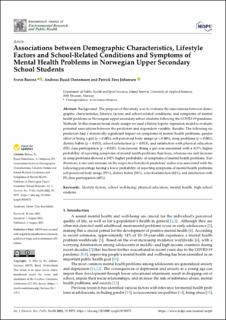| dc.contributor.author | Barene, Svein | |
| dc.contributor.author | Ruud-Tronsmoen, Andreas | |
| dc.contributor.author | Johansen, Patrick Foss | |
| dc.date.accessioned | 2023-02-24T08:27:27Z | |
| dc.date.available | 2023-02-24T08:27:27Z | |
| dc.date.created | 2022-08-15T13:36:50Z | |
| dc.date.issued | 2022 | |
| dc.identifier.citation | International Journal of Environmental Research and Public Health (IJERPH). 2022, 19 (15), 9575-?. | en_US |
| dc.identifier.issn | 1661-7827 | |
| dc.identifier.uri | https://hdl.handle.net/11250/3053750 | |
| dc.description.abstract | Background: The purpose of this study was to evaluate the associations between demographic characteristics, lifestyle factors and school-related conditions, and symptoms of mental health problems in Norwegian upper secondary school students following the COVID-19 pandemic. Methods: In this cross-sectional study design we used a binary logistic regression model to evaluate potential associations between the predictors and dependent variable. Results: The following six predictors had a statistically significant impact on symptoms of mental health problems; gender effect of being a girl (p < 0.001), self-perceived body image (p < 0.001), sleep problems (p < 0.001), dietary habits (p = 0.033), school satisfaction (p = 0.013), and satisfaction with physical education (PE) class participation (p = 0.025). Conclusions: Being a girl was associated with a 315% higher probability of reporting symptoms of mental health problems than boys, whereas one unit increase in sleep problems showed a 192% higher probability of symptoms of mental health problems. Furthermore, a one unit increase on the respective beneficial predictors’ scales was associated with the following percentage having a lower probability of reporting symptoms of mental health problems; self-perceived body image (59%), dietary habits (58%), school satisfaction (82%), and satisfaction with PE class participation (68%). | |
| dc.language.iso | eng | en_US |
| dc.rights | Navngivelse 4.0 Internasjonal | * |
| dc.rights.uri | http://creativecommons.org/licenses/by/4.0/deed.no | * |
| dc.title | Associations between Demographic Characteristics, Lifestyle Factors and School-Related Conditions and Symptoms of Mental Health Problems in Norwegian Upper Secondary School Students | en_US |
| dc.title.alternative | Associations between Demographic Characteristics, Lifestyle Factors and School-Related Conditions and Symptoms of Mental Health Problems in Norwegian Upper Secondary School Students | en_US |
| dc.type | Peer reviewed | en_US |
| dc.type | Journal article | en_US |
| dc.description.version | publishedVersion | |
| dc.source.pagenumber | 9575-? | en_US |
| dc.source.volume | 19 | en_US |
| dc.source.journal | International Journal of Environmental Research and Public Health (IJERPH) | en_US |
| dc.source.issue | 15 | en_US |
| dc.identifier.doi | 10.3390/ijerph19159575 | |
| dc.identifier.cristin | 2043080 | |
| cristin.ispublished | true | |
| cristin.fulltext | original | |
| cristin.qualitycode | 1 | |

